The Evolution of Technology in Tourism and Hospitality Industries
VerifiedAdded on 2023/01/12
|11
|3913
|60
Report
AI Summary
This report examines the profound impact of technology on the tourism and hospitality industries. It explores the historical development influenced by technological advancements, including online booking platforms and innovative in-room services. The report delves into the role of management information systems and global distribution systems, highlighting their significance in operational efficiency and decision-making. It further analyzes the influence of Online Travel Agencies (OTAs) and meta-search engines on industry development, emphasizing the importance of internet marketing and social media in reaching international audiences. Additionally, the report addresses the critical aspects of security and data protection in the implementation of technology within the sector, providing a comprehensive overview of the technological landscape and its implications for future growth.
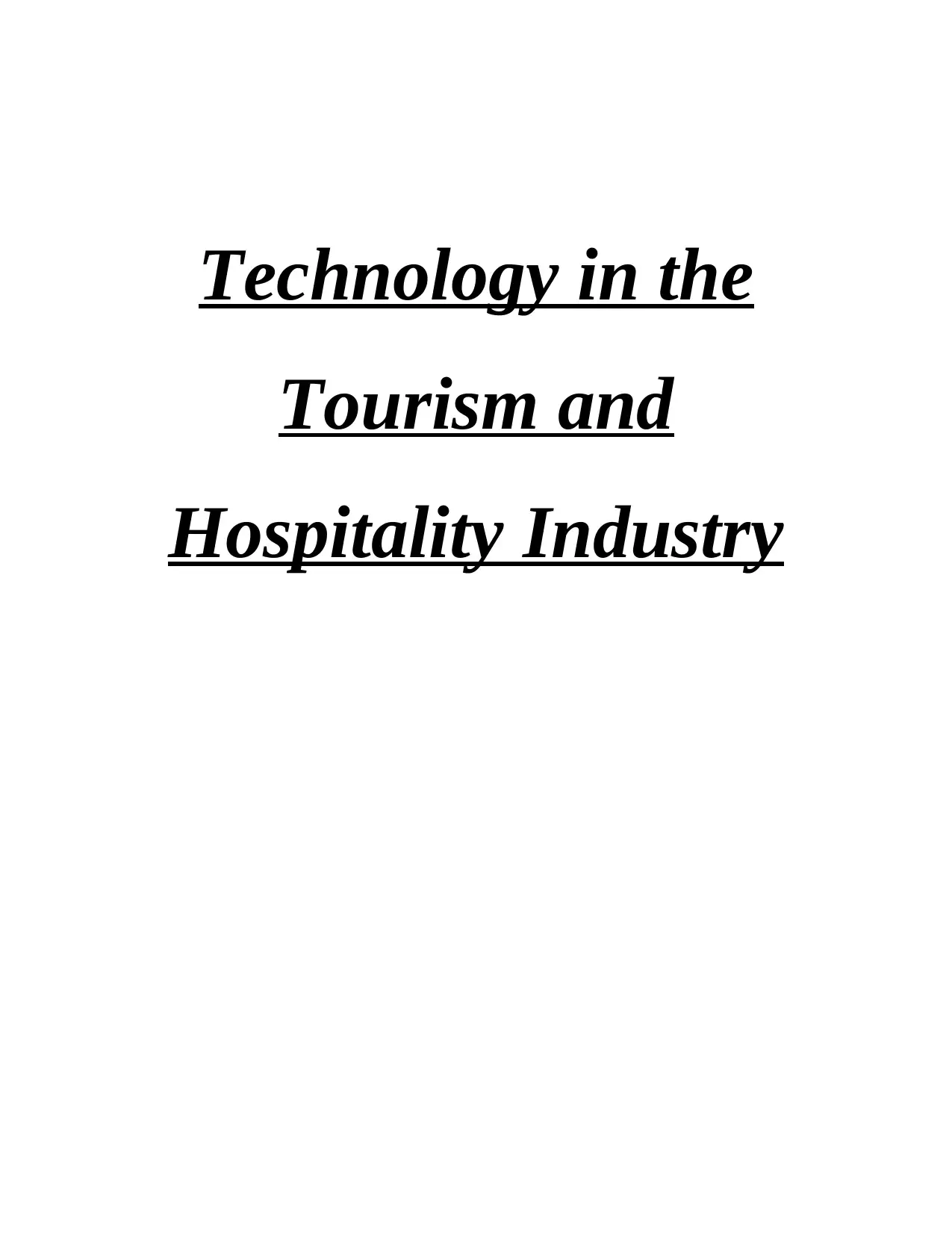
Technology in the
Tourism and
Hospitality Industry
Tourism and
Hospitality Industry
Paraphrase This Document
Need a fresh take? Get an instant paraphrase of this document with our AI Paraphraser
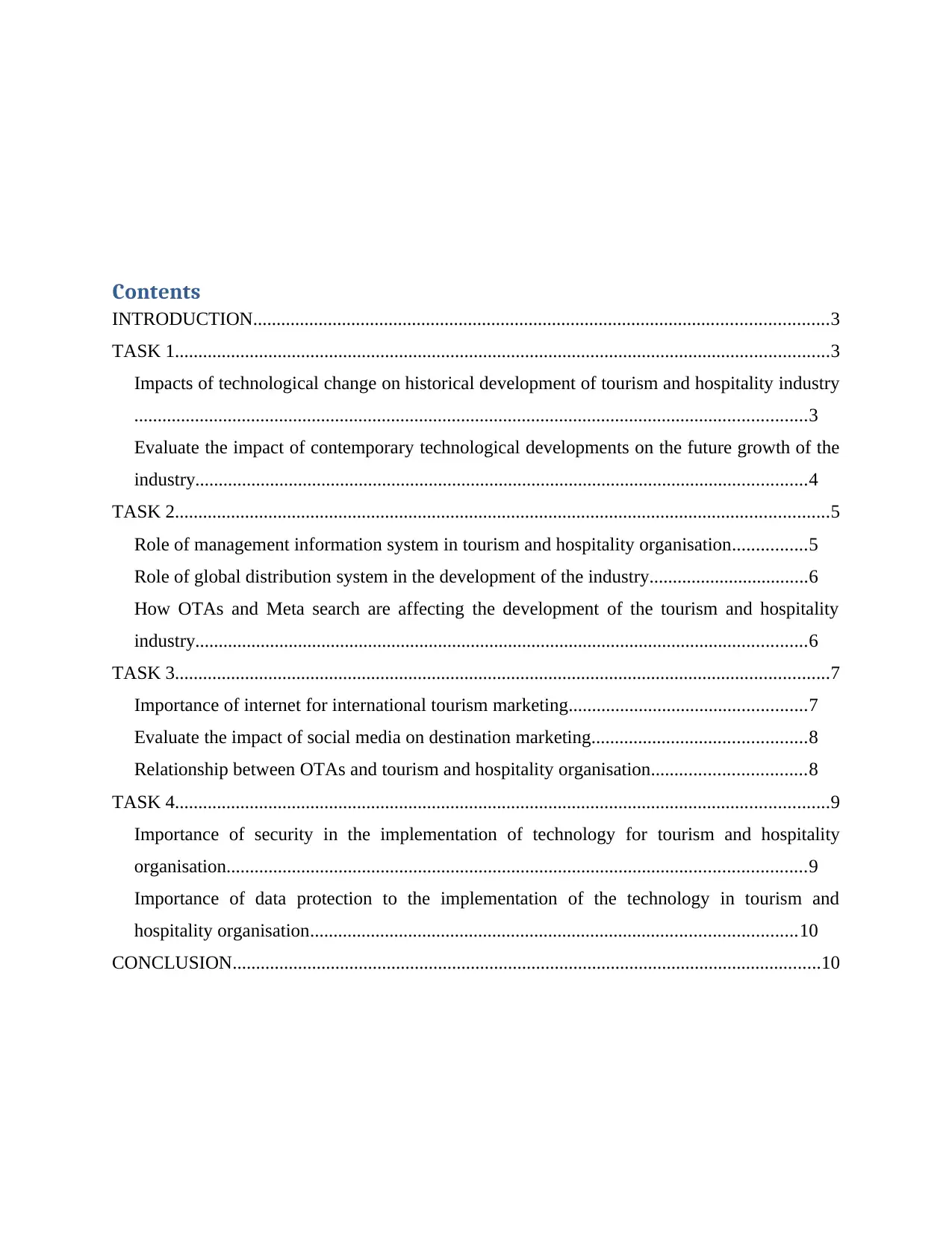
Contents
INTRODUCTION...........................................................................................................................3
TASK 1............................................................................................................................................3
Impacts of technological change on historical development of tourism and hospitality industry
................................................................................................................................................3
Evaluate the impact of contemporary technological developments on the future growth of the
industry...................................................................................................................................4
TASK 2............................................................................................................................................5
Role of management information system in tourism and hospitality organisation................5
Role of global distribution system in the development of the industry..................................6
How OTAs and Meta search are affecting the development of the tourism and hospitality
industry...................................................................................................................................6
TASK 3............................................................................................................................................7
Importance of internet for international tourism marketing...................................................7
Evaluate the impact of social media on destination marketing..............................................8
Relationship between OTAs and tourism and hospitality organisation.................................8
TASK 4............................................................................................................................................9
Importance of security in the implementation of technology for tourism and hospitality
organisation............................................................................................................................9
Importance of data protection to the implementation of the technology in tourism and
hospitality organisation........................................................................................................10
CONCLUSION..............................................................................................................................10
INTRODUCTION...........................................................................................................................3
TASK 1............................................................................................................................................3
Impacts of technological change on historical development of tourism and hospitality industry
................................................................................................................................................3
Evaluate the impact of contemporary technological developments on the future growth of the
industry...................................................................................................................................4
TASK 2............................................................................................................................................5
Role of management information system in tourism and hospitality organisation................5
Role of global distribution system in the development of the industry..................................6
How OTAs and Meta search are affecting the development of the tourism and hospitality
industry...................................................................................................................................6
TASK 3............................................................................................................................................7
Importance of internet for international tourism marketing...................................................7
Evaluate the impact of social media on destination marketing..............................................8
Relationship between OTAs and tourism and hospitality organisation.................................8
TASK 4............................................................................................................................................9
Importance of security in the implementation of technology for tourism and hospitality
organisation............................................................................................................................9
Importance of data protection to the implementation of the technology in tourism and
hospitality organisation........................................................................................................10
CONCLUSION..............................................................................................................................10
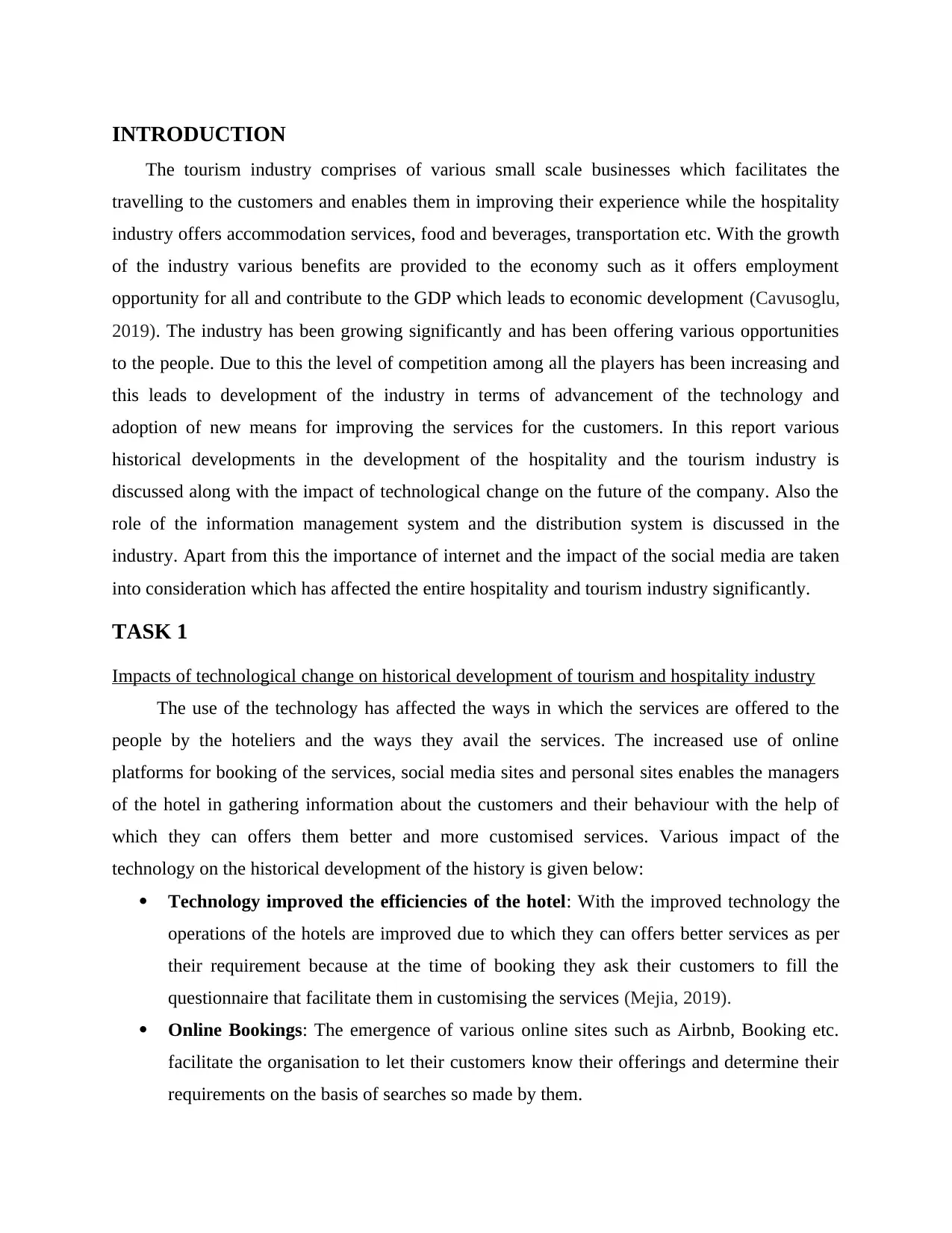
INTRODUCTION
The tourism industry comprises of various small scale businesses which facilitates the
travelling to the customers and enables them in improving their experience while the hospitality
industry offers accommodation services, food and beverages, transportation etc. With the growth
of the industry various benefits are provided to the economy such as it offers employment
opportunity for all and contribute to the GDP which leads to economic development (Cavusoglu,
2019). The industry has been growing significantly and has been offering various opportunities
to the people. Due to this the level of competition among all the players has been increasing and
this leads to development of the industry in terms of advancement of the technology and
adoption of new means for improving the services for the customers. In this report various
historical developments in the development of the hospitality and the tourism industry is
discussed along with the impact of technological change on the future of the company. Also the
role of the information management system and the distribution system is discussed in the
industry. Apart from this the importance of internet and the impact of the social media are taken
into consideration which has affected the entire hospitality and tourism industry significantly.
TASK 1
Impacts of technological change on historical development of tourism and hospitality industry
The use of the technology has affected the ways in which the services are offered to the
people by the hoteliers and the ways they avail the services. The increased use of online
platforms for booking of the services, social media sites and personal sites enables the managers
of the hotel in gathering information about the customers and their behaviour with the help of
which they can offers them better and more customised services. Various impact of the
technology on the historical development of the history is given below:
Technology improved the efficiencies of the hotel: With the improved technology the
operations of the hotels are improved due to which they can offers better services as per
their requirement because at the time of booking they ask their customers to fill the
questionnaire that facilitate them in customising the services (Mejia, 2019).
Online Bookings: The emergence of various online sites such as Airbnb, Booking etc.
facilitate the organisation to let their customers know their offerings and determine their
requirements on the basis of searches so made by them.
The tourism industry comprises of various small scale businesses which facilitates the
travelling to the customers and enables them in improving their experience while the hospitality
industry offers accommodation services, food and beverages, transportation etc. With the growth
of the industry various benefits are provided to the economy such as it offers employment
opportunity for all and contribute to the GDP which leads to economic development (Cavusoglu,
2019). The industry has been growing significantly and has been offering various opportunities
to the people. Due to this the level of competition among all the players has been increasing and
this leads to development of the industry in terms of advancement of the technology and
adoption of new means for improving the services for the customers. In this report various
historical developments in the development of the hospitality and the tourism industry is
discussed along with the impact of technological change on the future of the company. Also the
role of the information management system and the distribution system is discussed in the
industry. Apart from this the importance of internet and the impact of the social media are taken
into consideration which has affected the entire hospitality and tourism industry significantly.
TASK 1
Impacts of technological change on historical development of tourism and hospitality industry
The use of the technology has affected the ways in which the services are offered to the
people by the hoteliers and the ways they avail the services. The increased use of online
platforms for booking of the services, social media sites and personal sites enables the managers
of the hotel in gathering information about the customers and their behaviour with the help of
which they can offers them better and more customised services. Various impact of the
technology on the historical development of the history is given below:
Technology improved the efficiencies of the hotel: With the improved technology the
operations of the hotels are improved due to which they can offers better services as per
their requirement because at the time of booking they ask their customers to fill the
questionnaire that facilitate them in customising the services (Mejia, 2019).
Online Bookings: The emergence of various online sites such as Airbnb, Booking etc.
facilitate the organisation to let their customers know their offerings and determine their
requirements on the basis of searches so made by them.
⊘ This is a preview!⊘
Do you want full access?
Subscribe today to unlock all pages.

Trusted by 1+ million students worldwide
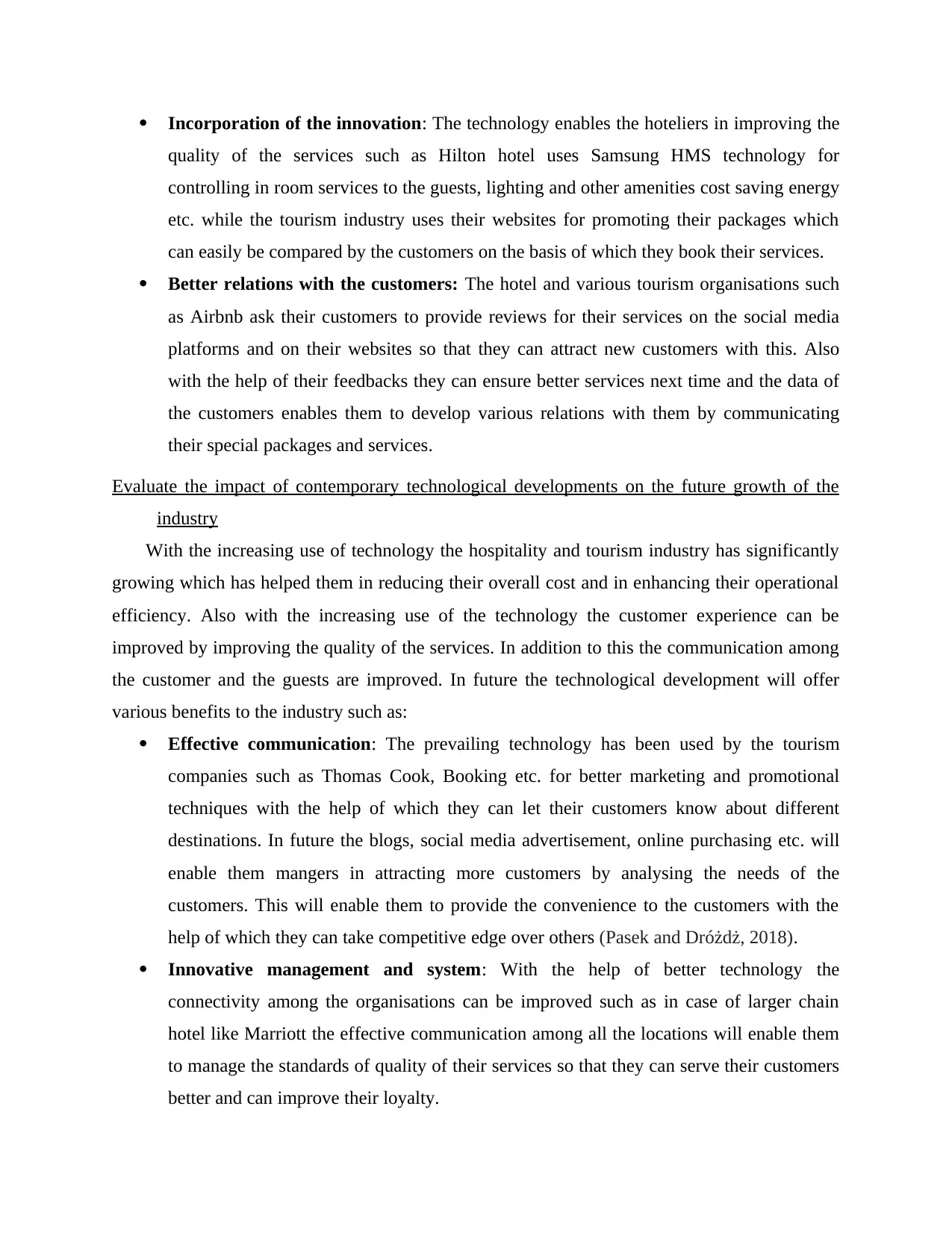
Incorporation of the innovation: The technology enables the hoteliers in improving the
quality of the services such as Hilton hotel uses Samsung HMS technology for
controlling in room services to the guests, lighting and other amenities cost saving energy
etc. while the tourism industry uses their websites for promoting their packages which
can easily be compared by the customers on the basis of which they book their services.
Better relations with the customers: The hotel and various tourism organisations such
as Airbnb ask their customers to provide reviews for their services on the social media
platforms and on their websites so that they can attract new customers with this. Also
with the help of their feedbacks they can ensure better services next time and the data of
the customers enables them to develop various relations with them by communicating
their special packages and services.
Evaluate the impact of contemporary technological developments on the future growth of the
industry
With the increasing use of technology the hospitality and tourism industry has significantly
growing which has helped them in reducing their overall cost and in enhancing their operational
efficiency. Also with the increasing use of the technology the customer experience can be
improved by improving the quality of the services. In addition to this the communication among
the customer and the guests are improved. In future the technological development will offer
various benefits to the industry such as:
Effective communication: The prevailing technology has been used by the tourism
companies such as Thomas Cook, Booking etc. for better marketing and promotional
techniques with the help of which they can let their customers know about different
destinations. In future the blogs, social media advertisement, online purchasing etc. will
enable them mangers in attracting more customers by analysing the needs of the
customers. This will enable them to provide the convenience to the customers with the
help of which they can take competitive edge over others (Pasek and Dróżdż, 2018).
Innovative management and system: With the help of better technology the
connectivity among the organisations can be improved such as in case of larger chain
hotel like Marriott the effective communication among all the locations will enable them
to manage the standards of quality of their services so that they can serve their customers
better and can improve their loyalty.
quality of the services such as Hilton hotel uses Samsung HMS technology for
controlling in room services to the guests, lighting and other amenities cost saving energy
etc. while the tourism industry uses their websites for promoting their packages which
can easily be compared by the customers on the basis of which they book their services.
Better relations with the customers: The hotel and various tourism organisations such
as Airbnb ask their customers to provide reviews for their services on the social media
platforms and on their websites so that they can attract new customers with this. Also
with the help of their feedbacks they can ensure better services next time and the data of
the customers enables them to develop various relations with them by communicating
their special packages and services.
Evaluate the impact of contemporary technological developments on the future growth of the
industry
With the increasing use of technology the hospitality and tourism industry has significantly
growing which has helped them in reducing their overall cost and in enhancing their operational
efficiency. Also with the increasing use of the technology the customer experience can be
improved by improving the quality of the services. In addition to this the communication among
the customer and the guests are improved. In future the technological development will offer
various benefits to the industry such as:
Effective communication: The prevailing technology has been used by the tourism
companies such as Thomas Cook, Booking etc. for better marketing and promotional
techniques with the help of which they can let their customers know about different
destinations. In future the blogs, social media advertisement, online purchasing etc. will
enable them mangers in attracting more customers by analysing the needs of the
customers. This will enable them to provide the convenience to the customers with the
help of which they can take competitive edge over others (Pasek and Dróżdż, 2018).
Innovative management and system: With the help of better technology the
connectivity among the organisations can be improved such as in case of larger chain
hotel like Marriott the effective communication among all the locations will enable them
to manage the standards of quality of their services so that they can serve their customers
better and can improve their loyalty.
Paraphrase This Document
Need a fresh take? Get an instant paraphrase of this document with our AI Paraphraser
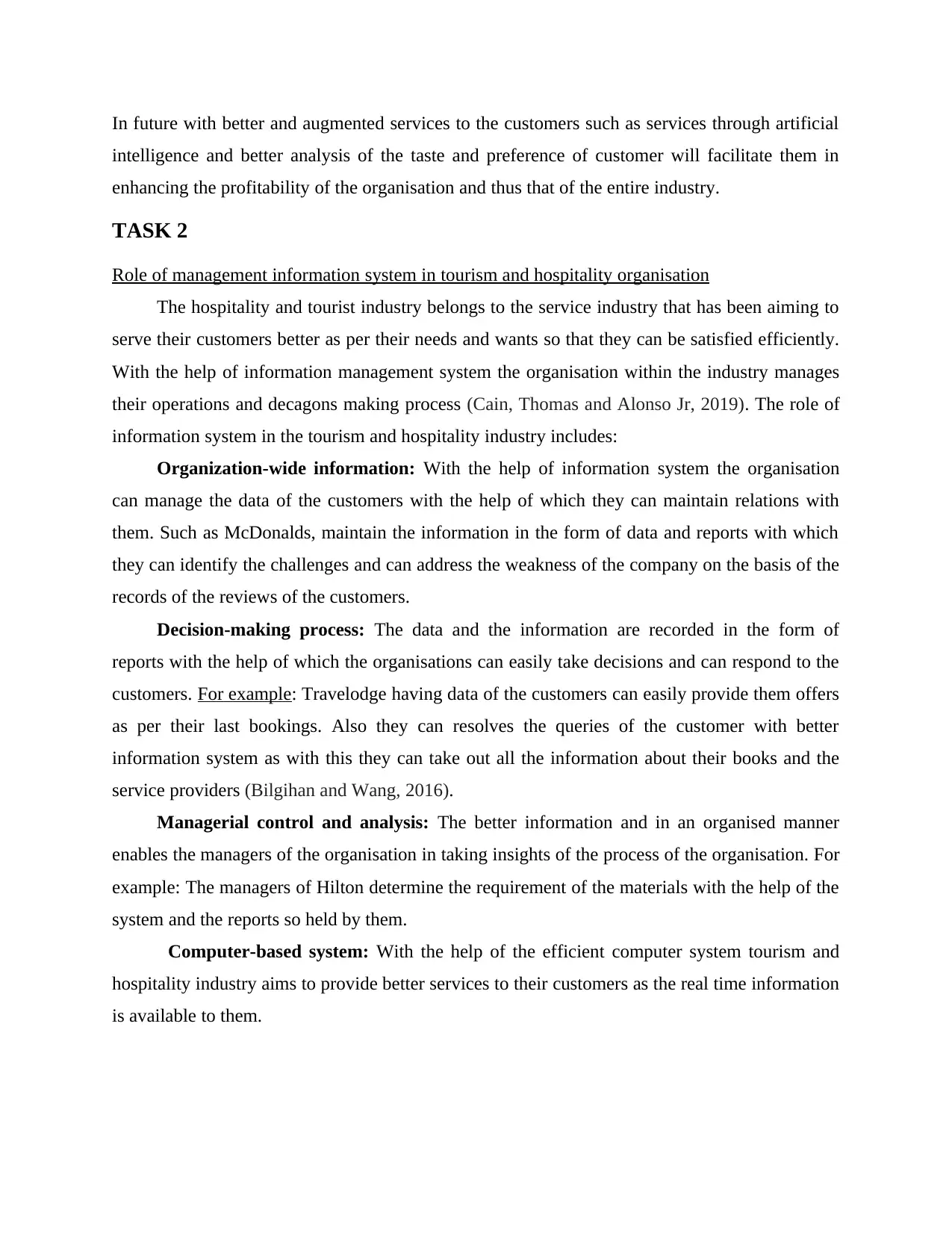
In future with better and augmented services to the customers such as services through artificial
intelligence and better analysis of the taste and preference of customer will facilitate them in
enhancing the profitability of the organisation and thus that of the entire industry.
TASK 2
Role of management information system in tourism and hospitality organisation
The hospitality and tourist industry belongs to the service industry that has been aiming to
serve their customers better as per their needs and wants so that they can be satisfied efficiently.
With the help of information management system the organisation within the industry manages
their operations and decagons making process (Cain, Thomas and Alonso Jr, 2019). The role of
information system in the tourism and hospitality industry includes:
Organization-wide information: With the help of information system the organisation
can manage the data of the customers with the help of which they can maintain relations with
them. Such as McDonalds, maintain the information in the form of data and reports with which
they can identify the challenges and can address the weakness of the company on the basis of the
records of the reviews of the customers.
Decision-making process: The data and the information are recorded in the form of
reports with the help of which the organisations can easily take decisions and can respond to the
customers. For example: Travelodge having data of the customers can easily provide them offers
as per their last bookings. Also they can resolves the queries of the customer with better
information system as with this they can take out all the information about their books and the
service providers (Bilgihan and Wang, 2016).
Managerial control and analysis: The better information and in an organised manner
enables the managers of the organisation in taking insights of the process of the organisation. For
example: The managers of Hilton determine the requirement of the materials with the help of the
system and the reports so held by them.
Computer-based system: With the help of the efficient computer system tourism and
hospitality industry aims to provide better services to their customers as the real time information
is available to them.
intelligence and better analysis of the taste and preference of customer will facilitate them in
enhancing the profitability of the organisation and thus that of the entire industry.
TASK 2
Role of management information system in tourism and hospitality organisation
The hospitality and tourist industry belongs to the service industry that has been aiming to
serve their customers better as per their needs and wants so that they can be satisfied efficiently.
With the help of information management system the organisation within the industry manages
their operations and decagons making process (Cain, Thomas and Alonso Jr, 2019). The role of
information system in the tourism and hospitality industry includes:
Organization-wide information: With the help of information system the organisation
can manage the data of the customers with the help of which they can maintain relations with
them. Such as McDonalds, maintain the information in the form of data and reports with which
they can identify the challenges and can address the weakness of the company on the basis of the
records of the reviews of the customers.
Decision-making process: The data and the information are recorded in the form of
reports with the help of which the organisations can easily take decisions and can respond to the
customers. For example: Travelodge having data of the customers can easily provide them offers
as per their last bookings. Also they can resolves the queries of the customer with better
information system as with this they can take out all the information about their books and the
service providers (Bilgihan and Wang, 2016).
Managerial control and analysis: The better information and in an organised manner
enables the managers of the organisation in taking insights of the process of the organisation. For
example: The managers of Hilton determine the requirement of the materials with the help of the
system and the reports so held by them.
Computer-based system: With the help of the efficient computer system tourism and
hospitality industry aims to provide better services to their customers as the real time information
is available to them.
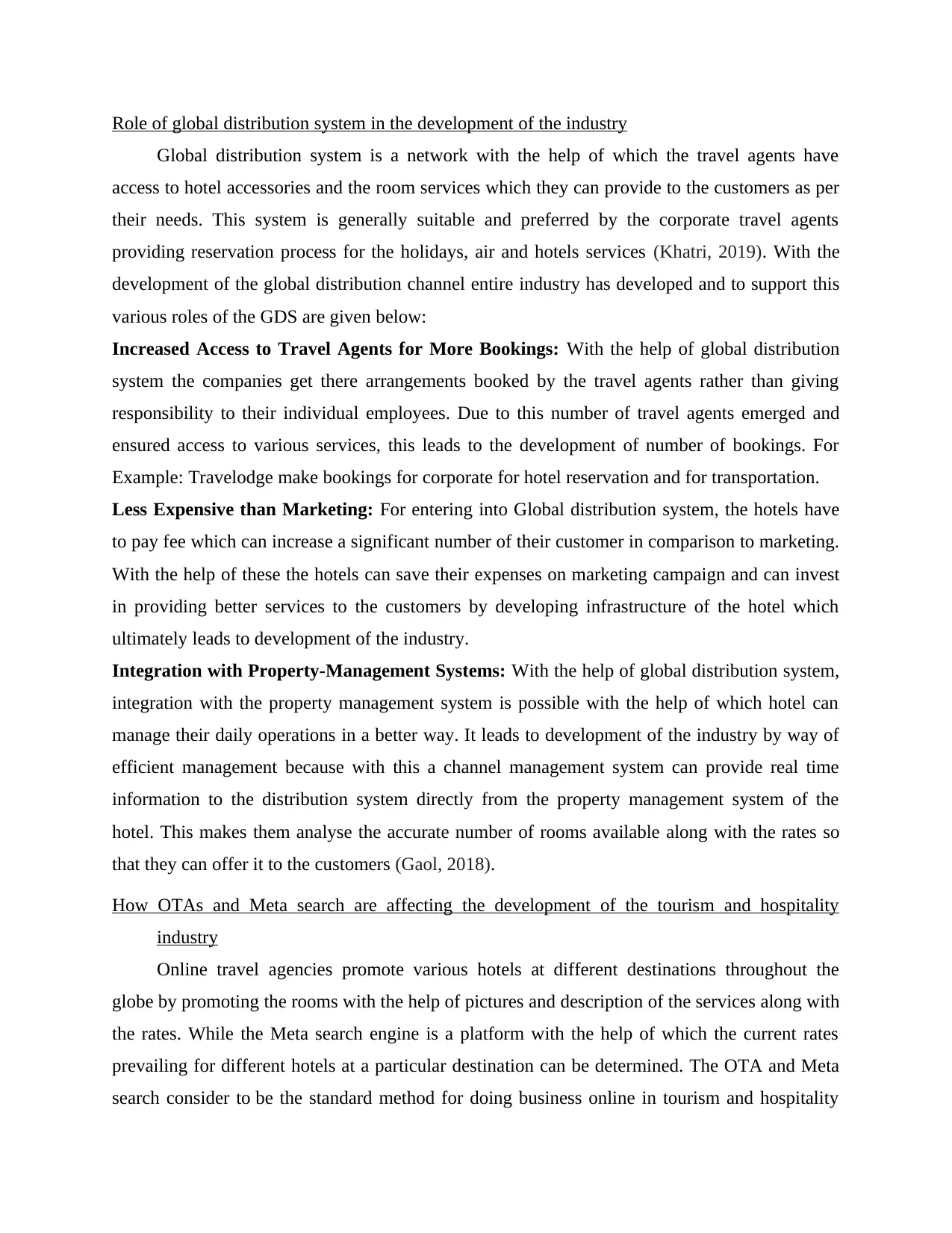
Role of global distribution system in the development of the industry
Global distribution system is a network with the help of which the travel agents have
access to hotel accessories and the room services which they can provide to the customers as per
their needs. This system is generally suitable and preferred by the corporate travel agents
providing reservation process for the holidays, air and hotels services (Khatri, 2019). With the
development of the global distribution channel entire industry has developed and to support this
various roles of the GDS are given below:
Increased Access to Travel Agents for More Bookings: With the help of global distribution
system the companies get there arrangements booked by the travel agents rather than giving
responsibility to their individual employees. Due to this number of travel agents emerged and
ensured access to various services, this leads to the development of number of bookings. For
Example: Travelodge make bookings for corporate for hotel reservation and for transportation.
Less Expensive than Marketing: For entering into Global distribution system, the hotels have
to pay fee which can increase a significant number of their customer in comparison to marketing.
With the help of these the hotels can save their expenses on marketing campaign and can invest
in providing better services to the customers by developing infrastructure of the hotel which
ultimately leads to development of the industry.
Integration with Property-Management Systems: With the help of global distribution system,
integration with the property management system is possible with the help of which hotel can
manage their daily operations in a better way. It leads to development of the industry by way of
efficient management because with this a channel management system can provide real time
information to the distribution system directly from the property management system of the
hotel. This makes them analyse the accurate number of rooms available along with the rates so
that they can offer it to the customers (Gaol, 2018).
How OTAs and Meta search are affecting the development of the tourism and hospitality
industry
Online travel agencies promote various hotels at different destinations throughout the
globe by promoting the rooms with the help of pictures and description of the services along with
the rates. While the Meta search engine is a platform with the help of which the current rates
prevailing for different hotels at a particular destination can be determined. The OTA and Meta
search consider to be the standard method for doing business online in tourism and hospitality
Global distribution system is a network with the help of which the travel agents have
access to hotel accessories and the room services which they can provide to the customers as per
their needs. This system is generally suitable and preferred by the corporate travel agents
providing reservation process for the holidays, air and hotels services (Khatri, 2019). With the
development of the global distribution channel entire industry has developed and to support this
various roles of the GDS are given below:
Increased Access to Travel Agents for More Bookings: With the help of global distribution
system the companies get there arrangements booked by the travel agents rather than giving
responsibility to their individual employees. Due to this number of travel agents emerged and
ensured access to various services, this leads to the development of number of bookings. For
Example: Travelodge make bookings for corporate for hotel reservation and for transportation.
Less Expensive than Marketing: For entering into Global distribution system, the hotels have
to pay fee which can increase a significant number of their customer in comparison to marketing.
With the help of these the hotels can save their expenses on marketing campaign and can invest
in providing better services to the customers by developing infrastructure of the hotel which
ultimately leads to development of the industry.
Integration with Property-Management Systems: With the help of global distribution system,
integration with the property management system is possible with the help of which hotel can
manage their daily operations in a better way. It leads to development of the industry by way of
efficient management because with this a channel management system can provide real time
information to the distribution system directly from the property management system of the
hotel. This makes them analyse the accurate number of rooms available along with the rates so
that they can offer it to the customers (Gaol, 2018).
How OTAs and Meta search are affecting the development of the tourism and hospitality
industry
Online travel agencies promote various hotels at different destinations throughout the
globe by promoting the rooms with the help of pictures and description of the services along with
the rates. While the Meta search engine is a platform with the help of which the current rates
prevailing for different hotels at a particular destination can be determined. The OTA and Meta
search consider to be the standard method for doing business online in tourism and hospitality
⊘ This is a preview!⊘
Do you want full access?
Subscribe today to unlock all pages.

Trusted by 1+ million students worldwide
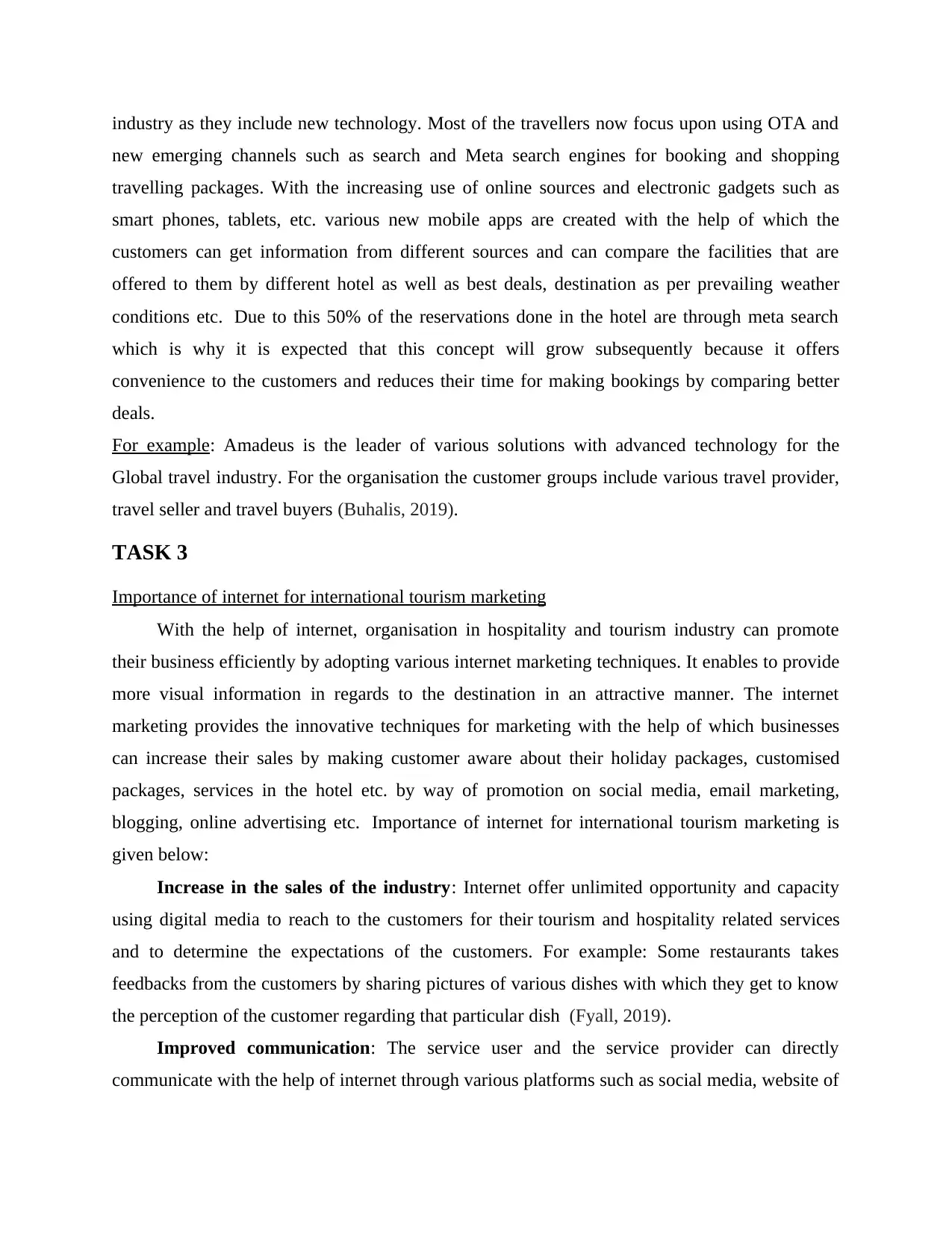
industry as they include new technology. Most of the travellers now focus upon using OTA and
new emerging channels such as search and Meta search engines for booking and shopping
travelling packages. With the increasing use of online sources and electronic gadgets such as
smart phones, tablets, etc. various new mobile apps are created with the help of which the
customers can get information from different sources and can compare the facilities that are
offered to them by different hotel as well as best deals, destination as per prevailing weather
conditions etc. Due to this 50% of the reservations done in the hotel are through meta search
which is why it is expected that this concept will grow subsequently because it offers
convenience to the customers and reduces their time for making bookings by comparing better
deals.
For example: Amadeus is the leader of various solutions with advanced technology for the
Global travel industry. For the organisation the customer groups include various travel provider,
travel seller and travel buyers (Buhalis, 2019).
TASK 3
Importance of internet for international tourism marketing
With the help of internet, organisation in hospitality and tourism industry can promote
their business efficiently by adopting various internet marketing techniques. It enables to provide
more visual information in regards to the destination in an attractive manner. The internet
marketing provides the innovative techniques for marketing with the help of which businesses
can increase their sales by making customer aware about their holiday packages, customised
packages, services in the hotel etc. by way of promotion on social media, email marketing,
blogging, online advertising etc. Importance of internet for international tourism marketing is
given below:
Increase in the sales of the industry: Internet offer unlimited opportunity and capacity
using digital media to reach to the customers for their tourism and hospitality related services
and to determine the expectations of the customers. For example: Some restaurants takes
feedbacks from the customers by sharing pictures of various dishes with which they get to know
the perception of the customer regarding that particular dish (Fyall, 2019).
Improved communication: The service user and the service provider can directly
communicate with the help of internet through various platforms such as social media, website of
new emerging channels such as search and Meta search engines for booking and shopping
travelling packages. With the increasing use of online sources and electronic gadgets such as
smart phones, tablets, etc. various new mobile apps are created with the help of which the
customers can get information from different sources and can compare the facilities that are
offered to them by different hotel as well as best deals, destination as per prevailing weather
conditions etc. Due to this 50% of the reservations done in the hotel are through meta search
which is why it is expected that this concept will grow subsequently because it offers
convenience to the customers and reduces their time for making bookings by comparing better
deals.
For example: Amadeus is the leader of various solutions with advanced technology for the
Global travel industry. For the organisation the customer groups include various travel provider,
travel seller and travel buyers (Buhalis, 2019).
TASK 3
Importance of internet for international tourism marketing
With the help of internet, organisation in hospitality and tourism industry can promote
their business efficiently by adopting various internet marketing techniques. It enables to provide
more visual information in regards to the destination in an attractive manner. The internet
marketing provides the innovative techniques for marketing with the help of which businesses
can increase their sales by making customer aware about their holiday packages, customised
packages, services in the hotel etc. by way of promotion on social media, email marketing,
blogging, online advertising etc. Importance of internet for international tourism marketing is
given below:
Increase in the sales of the industry: Internet offer unlimited opportunity and capacity
using digital media to reach to the customers for their tourism and hospitality related services
and to determine the expectations of the customers. For example: Some restaurants takes
feedbacks from the customers by sharing pictures of various dishes with which they get to know
the perception of the customer regarding that particular dish (Fyall, 2019).
Improved communication: The service user and the service provider can directly
communicate with the help of internet through various platforms such as social media, website of
Paraphrase This Document
Need a fresh take? Get an instant paraphrase of this document with our AI Paraphraser
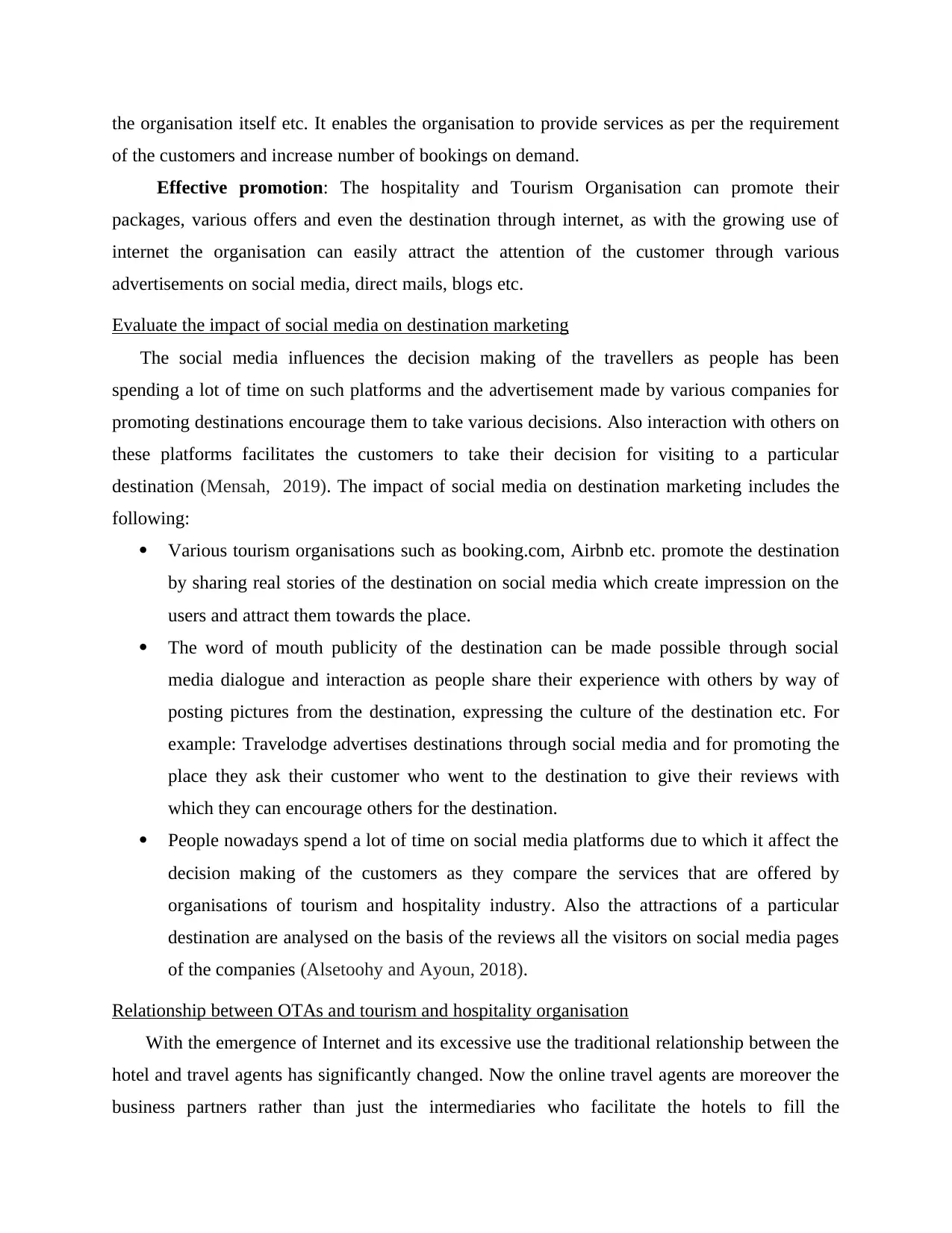
the organisation itself etc. It enables the organisation to provide services as per the requirement
of the customers and increase number of bookings on demand.
Effective promotion: The hospitality and Tourism Organisation can promote their
packages, various offers and even the destination through internet, as with the growing use of
internet the organisation can easily attract the attention of the customer through various
advertisements on social media, direct mails, blogs etc.
Evaluate the impact of social media on destination marketing
The social media influences the decision making of the travellers as people has been
spending a lot of time on such platforms and the advertisement made by various companies for
promoting destinations encourage them to take various decisions. Also interaction with others on
these platforms facilitates the customers to take their decision for visiting to a particular
destination (Mensah, 2019). The impact of social media on destination marketing includes the
following:
Various tourism organisations such as booking.com, Airbnb etc. promote the destination
by sharing real stories of the destination on social media which create impression on the
users and attract them towards the place.
The word of mouth publicity of the destination can be made possible through social
media dialogue and interaction as people share their experience with others by way of
posting pictures from the destination, expressing the culture of the destination etc. For
example: Travelodge advertises destinations through social media and for promoting the
place they ask their customer who went to the destination to give their reviews with
which they can encourage others for the destination.
People nowadays spend a lot of time on social media platforms due to which it affect the
decision making of the customers as they compare the services that are offered by
organisations of tourism and hospitality industry. Also the attractions of a particular
destination are analysed on the basis of the reviews all the visitors on social media pages
of the companies (Alsetoohy and Ayoun, 2018).
Relationship between OTAs and tourism and hospitality organisation
With the emergence of Internet and its excessive use the traditional relationship between the
hotel and travel agents has significantly changed. Now the online travel agents are moreover the
business partners rather than just the intermediaries who facilitate the hotels to fill the
of the customers and increase number of bookings on demand.
Effective promotion: The hospitality and Tourism Organisation can promote their
packages, various offers and even the destination through internet, as with the growing use of
internet the organisation can easily attract the attention of the customer through various
advertisements on social media, direct mails, blogs etc.
Evaluate the impact of social media on destination marketing
The social media influences the decision making of the travellers as people has been
spending a lot of time on such platforms and the advertisement made by various companies for
promoting destinations encourage them to take various decisions. Also interaction with others on
these platforms facilitates the customers to take their decision for visiting to a particular
destination (Mensah, 2019). The impact of social media on destination marketing includes the
following:
Various tourism organisations such as booking.com, Airbnb etc. promote the destination
by sharing real stories of the destination on social media which create impression on the
users and attract them towards the place.
The word of mouth publicity of the destination can be made possible through social
media dialogue and interaction as people share their experience with others by way of
posting pictures from the destination, expressing the culture of the destination etc. For
example: Travelodge advertises destinations through social media and for promoting the
place they ask their customer who went to the destination to give their reviews with
which they can encourage others for the destination.
People nowadays spend a lot of time on social media platforms due to which it affect the
decision making of the customers as they compare the services that are offered by
organisations of tourism and hospitality industry. Also the attractions of a particular
destination are analysed on the basis of the reviews all the visitors on social media pages
of the companies (Alsetoohy and Ayoun, 2018).
Relationship between OTAs and tourism and hospitality organisation
With the emergence of Internet and its excessive use the traditional relationship between the
hotel and travel agents has significantly changed. Now the online travel agents are moreover the
business partners rather than just the intermediaries who facilitate the hotels to fill the
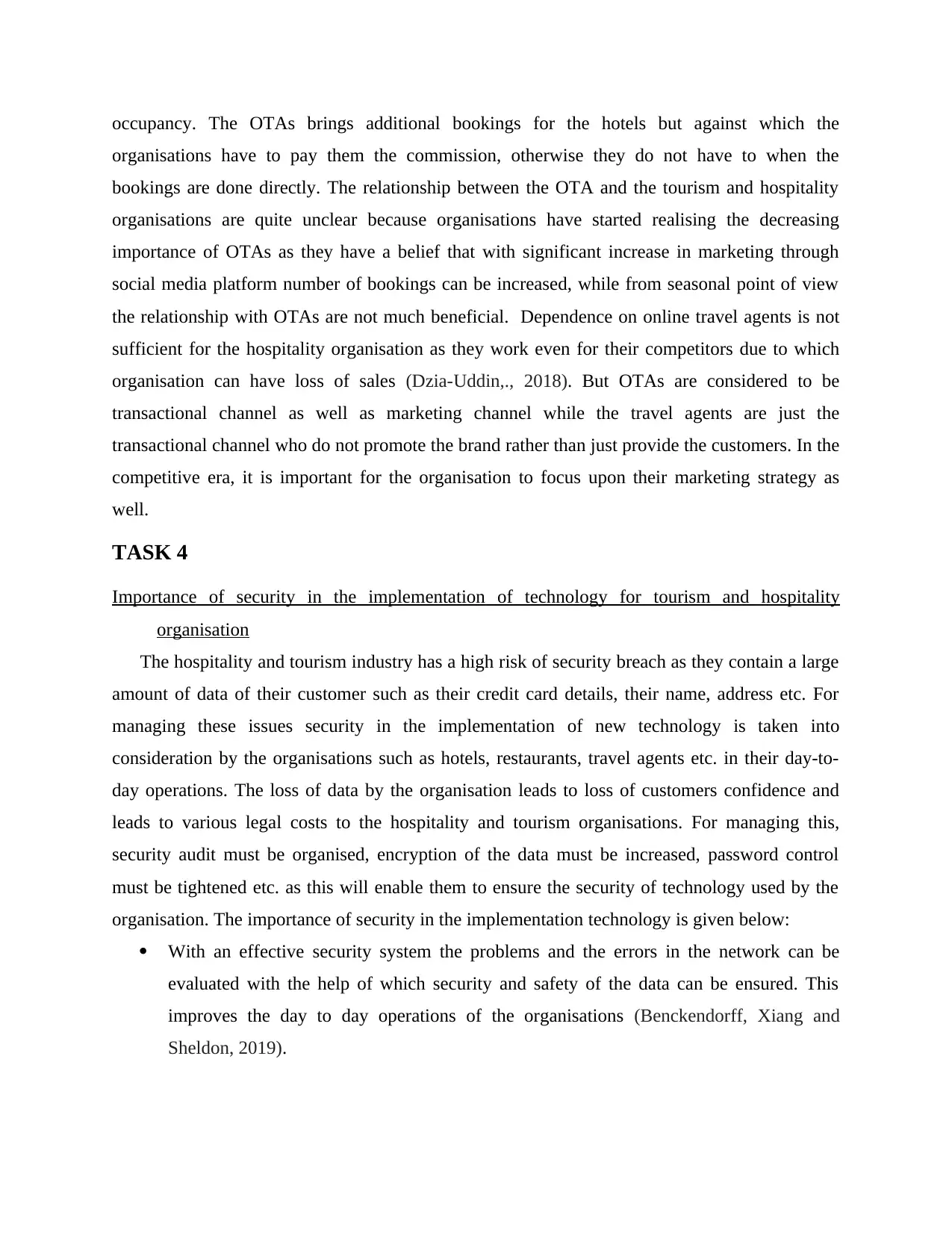
occupancy. The OTAs brings additional bookings for the hotels but against which the
organisations have to pay them the commission, otherwise they do not have to when the
bookings are done directly. The relationship between the OTA and the tourism and hospitality
organisations are quite unclear because organisations have started realising the decreasing
importance of OTAs as they have a belief that with significant increase in marketing through
social media platform number of bookings can be increased, while from seasonal point of view
the relationship with OTAs are not much beneficial. Dependence on online travel agents is not
sufficient for the hospitality organisation as they work even for their competitors due to which
organisation can have loss of sales (Dzia-Uddin,., 2018). But OTAs are considered to be
transactional channel as well as marketing channel while the travel agents are just the
transactional channel who do not promote the brand rather than just provide the customers. In the
competitive era, it is important for the organisation to focus upon their marketing strategy as
well.
TASK 4
Importance of security in the implementation of technology for tourism and hospitality
organisation
The hospitality and tourism industry has a high risk of security breach as they contain a large
amount of data of their customer such as their credit card details, their name, address etc. For
managing these issues security in the implementation of new technology is taken into
consideration by the organisations such as hotels, restaurants, travel agents etc. in their day-to-
day operations. The loss of data by the organisation leads to loss of customers confidence and
leads to various legal costs to the hospitality and tourism organisations. For managing this,
security audit must be organised, encryption of the data must be increased, password control
must be tightened etc. as this will enable them to ensure the security of technology used by the
organisation. The importance of security in the implementation technology is given below:
With an effective security system the problems and the errors in the network can be
evaluated with the help of which security and safety of the data can be ensured. This
improves the day to day operations of the organisations (Benckendorff, Xiang and
Sheldon, 2019).
organisations have to pay them the commission, otherwise they do not have to when the
bookings are done directly. The relationship between the OTA and the tourism and hospitality
organisations are quite unclear because organisations have started realising the decreasing
importance of OTAs as they have a belief that with significant increase in marketing through
social media platform number of bookings can be increased, while from seasonal point of view
the relationship with OTAs are not much beneficial. Dependence on online travel agents is not
sufficient for the hospitality organisation as they work even for their competitors due to which
organisation can have loss of sales (Dzia-Uddin,., 2018). But OTAs are considered to be
transactional channel as well as marketing channel while the travel agents are just the
transactional channel who do not promote the brand rather than just provide the customers. In the
competitive era, it is important for the organisation to focus upon their marketing strategy as
well.
TASK 4
Importance of security in the implementation of technology for tourism and hospitality
organisation
The hospitality and tourism industry has a high risk of security breach as they contain a large
amount of data of their customer such as their credit card details, their name, address etc. For
managing these issues security in the implementation of new technology is taken into
consideration by the organisations such as hotels, restaurants, travel agents etc. in their day-to-
day operations. The loss of data by the organisation leads to loss of customers confidence and
leads to various legal costs to the hospitality and tourism organisations. For managing this,
security audit must be organised, encryption of the data must be increased, password control
must be tightened etc. as this will enable them to ensure the security of technology used by the
organisation. The importance of security in the implementation technology is given below:
With an effective security system the problems and the errors in the network can be
evaluated with the help of which security and safety of the data can be ensured. This
improves the day to day operations of the organisations (Benckendorff, Xiang and
Sheldon, 2019).
⊘ This is a preview!⊘
Do you want full access?
Subscribe today to unlock all pages.

Trusted by 1+ million students worldwide
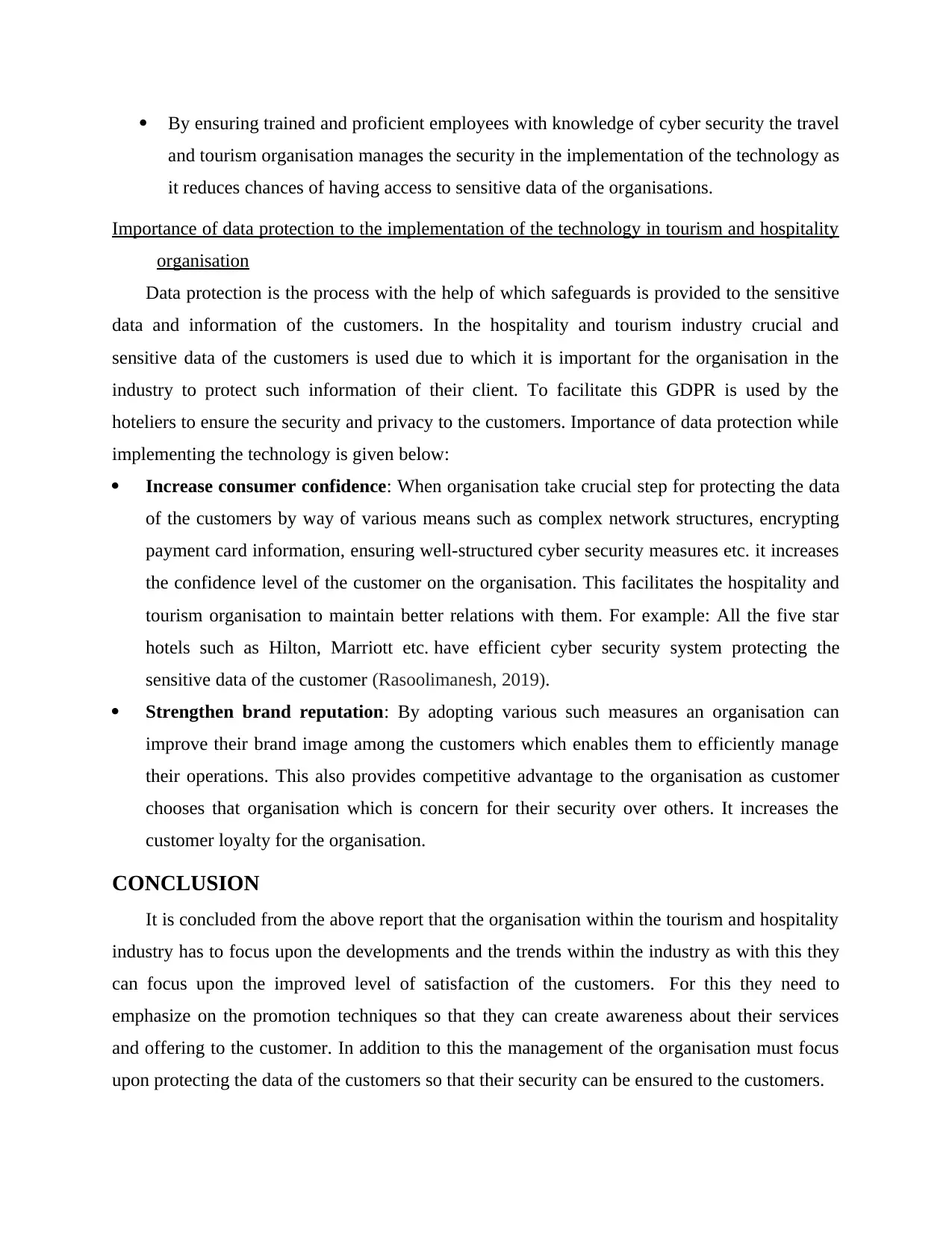
By ensuring trained and proficient employees with knowledge of cyber security the travel
and tourism organisation manages the security in the implementation of the technology as
it reduces chances of having access to sensitive data of the organisations.
Importance of data protection to the implementation of the technology in tourism and hospitality
organisation
Data protection is the process with the help of which safeguards is provided to the sensitive
data and information of the customers. In the hospitality and tourism industry crucial and
sensitive data of the customers is used due to which it is important for the organisation in the
industry to protect such information of their client. To facilitate this GDPR is used by the
hoteliers to ensure the security and privacy to the customers. Importance of data protection while
implementing the technology is given below:
Increase consumer confidence: When organisation take crucial step for protecting the data
of the customers by way of various means such as complex network structures, encrypting
payment card information, ensuring well-structured cyber security measures etc. it increases
the confidence level of the customer on the organisation. This facilitates the hospitality and
tourism organisation to maintain better relations with them. For example: All the five star
hotels such as Hilton, Marriott etc. have efficient cyber security system protecting the
sensitive data of the customer (Rasoolimanesh, 2019).
Strengthen brand reputation: By adopting various such measures an organisation can
improve their brand image among the customers which enables them to efficiently manage
their operations. This also provides competitive advantage to the organisation as customer
chooses that organisation which is concern for their security over others. It increases the
customer loyalty for the organisation.
CONCLUSION
It is concluded from the above report that the organisation within the tourism and hospitality
industry has to focus upon the developments and the trends within the industry as with this they
can focus upon the improved level of satisfaction of the customers. For this they need to
emphasize on the promotion techniques so that they can create awareness about their services
and offering to the customer. In addition to this the management of the organisation must focus
upon protecting the data of the customers so that their security can be ensured to the customers.
and tourism organisation manages the security in the implementation of the technology as
it reduces chances of having access to sensitive data of the organisations.
Importance of data protection to the implementation of the technology in tourism and hospitality
organisation
Data protection is the process with the help of which safeguards is provided to the sensitive
data and information of the customers. In the hospitality and tourism industry crucial and
sensitive data of the customers is used due to which it is important for the organisation in the
industry to protect such information of their client. To facilitate this GDPR is used by the
hoteliers to ensure the security and privacy to the customers. Importance of data protection while
implementing the technology is given below:
Increase consumer confidence: When organisation take crucial step for protecting the data
of the customers by way of various means such as complex network structures, encrypting
payment card information, ensuring well-structured cyber security measures etc. it increases
the confidence level of the customer on the organisation. This facilitates the hospitality and
tourism organisation to maintain better relations with them. For example: All the five star
hotels such as Hilton, Marriott etc. have efficient cyber security system protecting the
sensitive data of the customer (Rasoolimanesh, 2019).
Strengthen brand reputation: By adopting various such measures an organisation can
improve their brand image among the customers which enables them to efficiently manage
their operations. This also provides competitive advantage to the organisation as customer
chooses that organisation which is concern for their security over others. It increases the
customer loyalty for the organisation.
CONCLUSION
It is concluded from the above report that the organisation within the tourism and hospitality
industry has to focus upon the developments and the trends within the industry as with this they
can focus upon the improved level of satisfaction of the customers. For this they need to
emphasize on the promotion techniques so that they can create awareness about their services
and offering to the customer. In addition to this the management of the organisation must focus
upon protecting the data of the customers so that their security can be ensured to the customers.
Paraphrase This Document
Need a fresh take? Get an instant paraphrase of this document with our AI Paraphraser
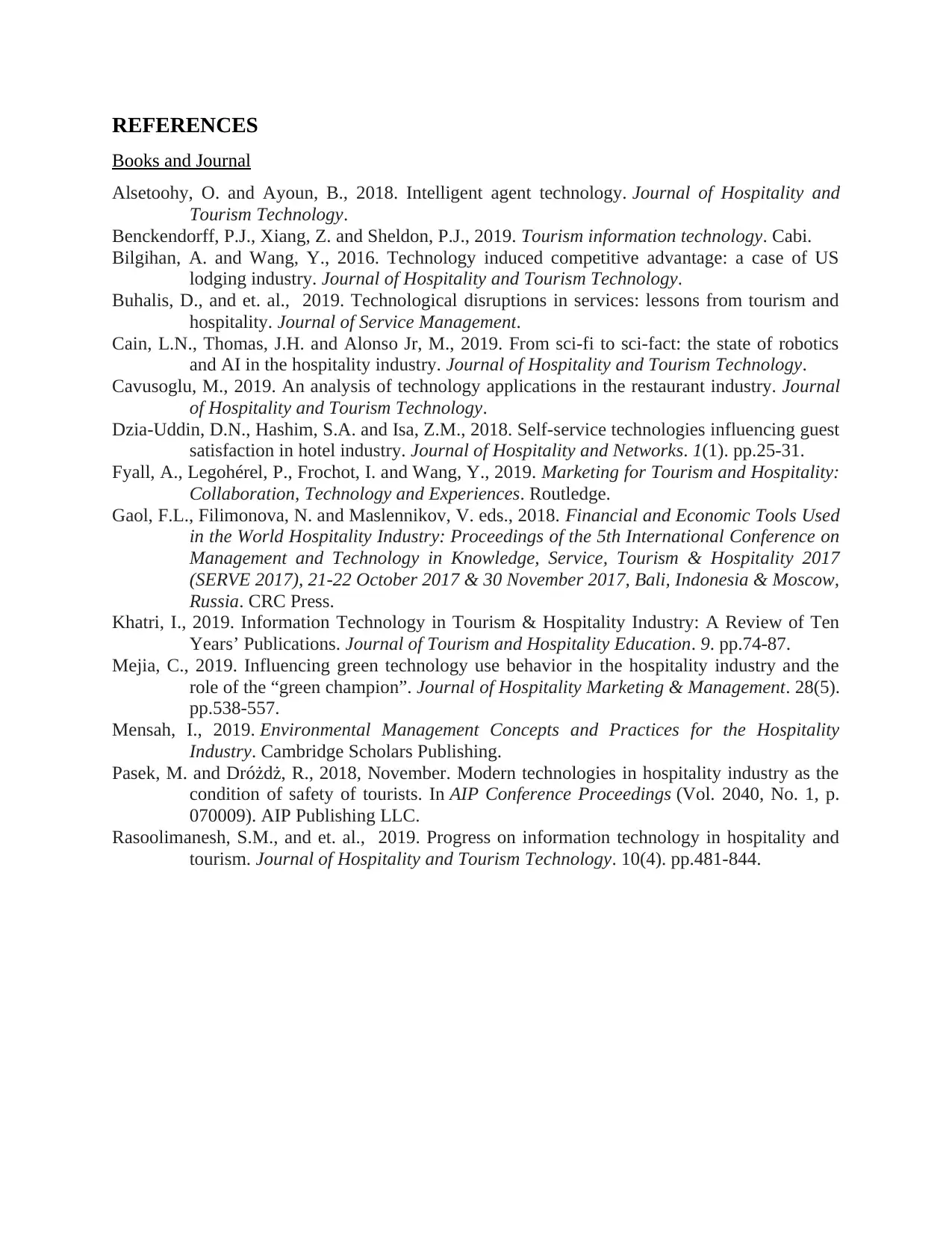
REFERENCES
Books and Journal
Alsetoohy, O. and Ayoun, B., 2018. Intelligent agent technology. Journal of Hospitality and
Tourism Technology.
Benckendorff, P.J., Xiang, Z. and Sheldon, P.J., 2019. Tourism information technology. Cabi.
Bilgihan, A. and Wang, Y., 2016. Technology induced competitive advantage: a case of US
lodging industry. Journal of Hospitality and Tourism Technology.
Buhalis, D., and et. al., 2019. Technological disruptions in services: lessons from tourism and
hospitality. Journal of Service Management.
Cain, L.N., Thomas, J.H. and Alonso Jr, M., 2019. From sci-fi to sci-fact: the state of robotics
and AI in the hospitality industry. Journal of Hospitality and Tourism Technology.
Cavusoglu, M., 2019. An analysis of technology applications in the restaurant industry. Journal
of Hospitality and Tourism Technology.
Dzia-Uddin, D.N., Hashim, S.A. and Isa, Z.M., 2018. Self-service technologies influencing guest
satisfaction in hotel industry. Journal of Hospitality and Networks. 1(1). pp.25-31.
Fyall, A., Legohérel, P., Frochot, I. and Wang, Y., 2019. Marketing for Tourism and Hospitality:
Collaboration, Technology and Experiences. Routledge.
Gaol, F.L., Filimonova, N. and Maslennikov, V. eds., 2018. Financial and Economic Tools Used
in the World Hospitality Industry: Proceedings of the 5th International Conference on
Management and Technology in Knowledge, Service, Tourism & Hospitality 2017
(SERVE 2017), 21-22 October 2017 & 30 November 2017, Bali, Indonesia & Moscow,
Russia. CRC Press.
Khatri, I., 2019. Information Technology in Tourism & Hospitality Industry: A Review of Ten
Years’ Publications. Journal of Tourism and Hospitality Education. 9. pp.74-87.
Mejia, C., 2019. Influencing green technology use behavior in the hospitality industry and the
role of the “green champion”. Journal of Hospitality Marketing & Management. 28(5).
pp.538-557.
Mensah, I., 2019. Environmental Management Concepts and Practices for the Hospitality
Industry. Cambridge Scholars Publishing.
Pasek, M. and Dróżdż, R., 2018, November. Modern technologies in hospitality industry as the
condition of safety of tourists. In AIP Conference Proceedings (Vol. 2040, No. 1, p.
070009). AIP Publishing LLC.
Rasoolimanesh, S.M., and et. al., 2019. Progress on information technology in hospitality and
tourism. Journal of Hospitality and Tourism Technology. 10(4). pp.481-844.
Books and Journal
Alsetoohy, O. and Ayoun, B., 2018. Intelligent agent technology. Journal of Hospitality and
Tourism Technology.
Benckendorff, P.J., Xiang, Z. and Sheldon, P.J., 2019. Tourism information technology. Cabi.
Bilgihan, A. and Wang, Y., 2016. Technology induced competitive advantage: a case of US
lodging industry. Journal of Hospitality and Tourism Technology.
Buhalis, D., and et. al., 2019. Technological disruptions in services: lessons from tourism and
hospitality. Journal of Service Management.
Cain, L.N., Thomas, J.H. and Alonso Jr, M., 2019. From sci-fi to sci-fact: the state of robotics
and AI in the hospitality industry. Journal of Hospitality and Tourism Technology.
Cavusoglu, M., 2019. An analysis of technology applications in the restaurant industry. Journal
of Hospitality and Tourism Technology.
Dzia-Uddin, D.N., Hashim, S.A. and Isa, Z.M., 2018. Self-service technologies influencing guest
satisfaction in hotel industry. Journal of Hospitality and Networks. 1(1). pp.25-31.
Fyall, A., Legohérel, P., Frochot, I. and Wang, Y., 2019. Marketing for Tourism and Hospitality:
Collaboration, Technology and Experiences. Routledge.
Gaol, F.L., Filimonova, N. and Maslennikov, V. eds., 2018. Financial and Economic Tools Used
in the World Hospitality Industry: Proceedings of the 5th International Conference on
Management and Technology in Knowledge, Service, Tourism & Hospitality 2017
(SERVE 2017), 21-22 October 2017 & 30 November 2017, Bali, Indonesia & Moscow,
Russia. CRC Press.
Khatri, I., 2019. Information Technology in Tourism & Hospitality Industry: A Review of Ten
Years’ Publications. Journal of Tourism and Hospitality Education. 9. pp.74-87.
Mejia, C., 2019. Influencing green technology use behavior in the hospitality industry and the
role of the “green champion”. Journal of Hospitality Marketing & Management. 28(5).
pp.538-557.
Mensah, I., 2019. Environmental Management Concepts and Practices for the Hospitality
Industry. Cambridge Scholars Publishing.
Pasek, M. and Dróżdż, R., 2018, November. Modern technologies in hospitality industry as the
condition of safety of tourists. In AIP Conference Proceedings (Vol. 2040, No. 1, p.
070009). AIP Publishing LLC.
Rasoolimanesh, S.M., and et. al., 2019. Progress on information technology in hospitality and
tourism. Journal of Hospitality and Tourism Technology. 10(4). pp.481-844.
1 out of 11
Related Documents
Your All-in-One AI-Powered Toolkit for Academic Success.
+13062052269
info@desklib.com
Available 24*7 on WhatsApp / Email
![[object Object]](/_next/static/media/star-bottom.7253800d.svg)
Unlock your academic potential
Copyright © 2020–2025 A2Z Services. All Rights Reserved. Developed and managed by ZUCOL.





